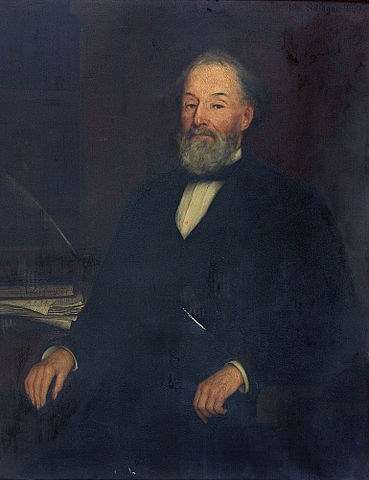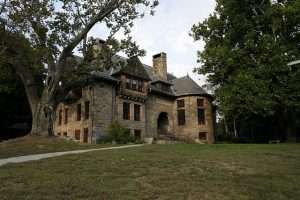Rowland Hazard was a well-known philosopher, politician and businessman, but he was proudest of something he did in the shadows: He released 100 African-Americans from New Orleans jails.
As a rich, Rhode Island textile manufacturer, he founded the Republican Party, inspired the Interstate Commerce Act and wrote books on philosophy, economics and politics.
His efforts to free black people wrongly jailed generated controversy for years. A friend had written a letter praising him for his actions. When his son published the letter, he left out Hazard’s name to protect him.
Rowland Hazard
Rowland Hazard was born Oct. 9, 1801 in South Kingstown, R.I. His father, the first Rowland Hazard, founded the Peace Dale Manufacturing Co. in Peace Dale, R.I. The senior Hazard named it after his wife, the former Mary Peace.
After he left school, the younger Rowland Hazard and his two brothers ran the family firm in Rhode Island. His grandson described him as genial and outgoing, but wrote that his manner hid a shy and reserved soul.
When Hazard reached his 30s, he was responsible for selling the company’s products. Those included sackcloth, ready-made clothing, cheap shoes and something called ‘Negro cloth’ for African-American slaves to Southern planters. He spent winters in New Orleans selling to planters from Louisiana, Mississippi and Alabama.
Many of the planters were his friends. So was the abolitionist William Ellery Channing.
Greatest Effort
His grandson, also named Rowland Hazard, described how his grandfather started the greatest effort of his life:
“In 1841, while in New Orleans, a respectable colored man of Newport, R.I., contrived to get word to my grandfather that he was detained in the chain gang,” wrote the grandson.
“In endeavoring to procure his release, my grandfather found that many free negroes were detained in the same way, deprived of their liberty and suffering great hardship. The only time he could see them was on Sundays and before sunrise or after sunset. For weeks he allowed himself only five hours sleep, and visited the jails of the city, collecting information about these unfortunate men.”
Jacob Barker, an insurance lawyer, volunteered his help. A fellow Quaker from Swan Island, Maine, he had gotten a $5 million loan for the U.S. government during the War of 1812.
They went to court. The judge ordered the first group released from jail. He decided a man could not be presumed to be a slave unless his blood was 51 percent black. Six men came to court to test the point; five went free. People threatened to lynch Hazard.
In the Shadows
Wrote Hazard’s grandson, “So intense was the feeling against him that his friends were afraid to address him by name.” A letter survived addressed by its sender to “Mr. John Smith, at the residence of Mr. Barker, New Orleans,” he wrote. The sender hid the proper address, to Mr. Hazard, inside the wrapper.
“Mr. Hazard. Many of the pathetic appeals from men kept for months in jail were addressed in the same way, sent to Mr. Barker’s care, with no mention of Hazard at all,” wrote the grandson.
The next winter, a New Orleans grand jury issued astonishing instructions to prosecutors. They were to proceed against some of Hazard’s planter friends for cruelty to African-Americans.
William Ellery Channing wrote, “You and Mr. Barker teach us never to despair.”
Rowland Hazard stopped spending winters in New Orleans, and the Southern market dried up for the Peace Dale Manufacturing Co.’s cheap cotton products. In 1849 the company started making woolen shawls and other high-end woolens.
Rowland Hazard later got entangled in the Credit Mobilier scandal. He died on June 24, 1888. His descendant became known as the Rowland H. who helped start Alcoholics Anonymous.
Photo: Peace Dale Library by By JacobKlinger – Own work, CC BY-SA 3.0, https://commons.wikimedia.org/w/index.php?curid=21810738. This story was updated in 2024.



1 comment
[…] financed the Union Pacific Railroad by starting Credit Mobilier with Thomas Durant and financing from 16 friends. He invested in real estate along the proposed […]
Comments are closed.